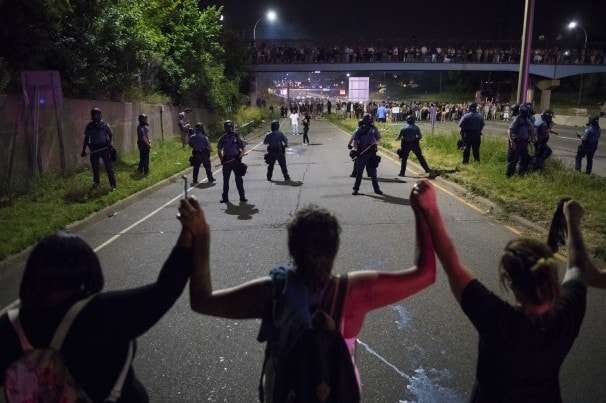The Volokh Conspiracy
Mostly law professors | Sometimes contrarian | Often libertarian | Always independent
Reducing police abuses by reducing the number of hostile interactions between police and civilians

Recent incidents have once again put the spotlight on the problem of police brutality and excessive use of force, particularly against African-Americans. Many people concerned about this issue assume that the main cause must be racism. Racism undoubtedly plays a role in some cases. But, as Harvard economist Sendhil Mullainathan explained in an October New York Times column, the more important cause is the sheer number of potentially hostile interactions between police and poor African-Americans:
Police bias may well be a significant problem, but in accounting for why some of these encounters turn into killings, it is swamped by other, bigger problems….
Police killings are a race problem: African-Americans are being killed disproportionately and by a wide margin. And police bias may be responsible. But this data does not prove that biased police officers are more likely to shoot blacks in any given encounter.
Instead, there is another possibility: It is simply that - for reasons that may well include police bias - African-Americans have a very large number of encounters with police officers. Every police encounter contains a risk: The officer might be poorly trained, might act with malice or simply make a mistake, and civilians might do something that is perceived as a threat. The omnipresence of guns exaggerates all these risks.
Such risks exist for people of any race…. But having more encounters with police officers, even with officers entirely free of racial bias, can create a greater risk of a fatal shooting.
Arrest data lets us measure this possibility. For the entire country, 28.9 percent of arrestees were African-American. This number is not very different from the 31.8 percent of police-shooting victims who were African-Americans. If police discrimination were a big factor in the actual killings, we would have expected a larger gap between the arrest rate and the police-killing rate.
If we want to reduce the incidence of abusive police behavior towards African-Americans (and other civilians), one way to do so is to reduce the number of potentially hostile interactions between police and civilians. Even if police are entirely free of racial bias, every such encounter has the potential to escalate to violence - with possibly fatal results.
Fortunately, there are many ways we can reduce the number of such interactions without endangering public safety. We could start by cutting back on the War on Drugs, which accounts for a large proportion of the hostile interactions between the police and African-Americans. We should also consider curbing the enormous proliferation of other criminal laws, which have reached the point where the vast majority of adult Americans have violated one or another such law at some time in their lives. Eric Garner, the victim of one of the most notorious abusive police killings in recent years, died in the course of an arrest for selling untaxed cigarettes. We should think carefully about whether it is really necessary to criminalize such transactions, even at the cost of killing and injuring people in the process.
As Conor Friedersdorf points out, we can also reduce the incidence of traffic stops, of the sort which led to the the death of Philando Castile. Too many jurisdictions use traffic tickets as a source of revenue, rather than as a tool for protecting public safety. In recent years, the Dallas police department has greatly reduced revenue-raising traffic stops, without thereby increasing the rate of car accidents. Other jurisdictions can learn from that example.
More generally, we should avoid passing laws we aren't willing to kill to enforce. Ultimately, any law whose enforcement requires the police to arrest and otherwise coerce people creates a risk of violence and death. For any given arrest, search, or traffic stop, the risk of such escalation may be very low. But multiplied over thousands or millions of such cases, it becomes almost certain that innocent people will be injured or killed in some instances. Even the best police forces include some officers who are abusive, racist, trigger-happy, or simply prone to making honest mistakes.
Reducing opportunities for hostile interactions between police and civilians is likely to benefit cops as well as citizens. Police officers, too, sometimes get injured or killed when incidents escalate. Moreover, reducing the incidence of citizen-police violence might also reduce the distrust that has arisen between police and poor minority communities. A more supportive community can make life easier for the police in a variety of ways. An incremental reduction in police abuses probably would not have changed the minds of the sorts of extremists who perpetrated the horrible recent attack against the Dallas police. But it could affect the views of more open-minded people.
Diminishing the time and effort expended on dubious arrests and searches could make more resources available for combating theft and violent crime. That too, is likely to benefit both police and civilians.
Obviously, reducing overcriminalization is not the only possible strategy for curbing police abuses. We should also rethink the excessive militarization of many police forces, and address various ways in which the criminal justice system often fails to hold abusive officers accountable for their actions. Nonetheless, overcriminalization is a much larger piece of this puzzle than many people recognize. It should get more attention in the ongoing debate over police abuses than has so far been the case.


Show Comments (0)